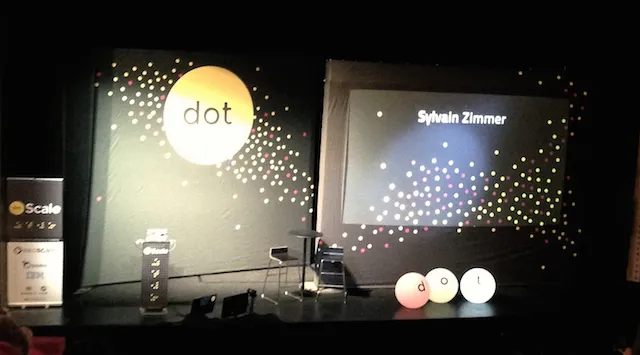
DotScale 2015 Conference Summary

This week, I had the chance attented to the DotScale 2015, one of the series of Dot conferences. Most conferences were about databases, distributed systems and server uptime.
Unattended Reboots Using a Distributed Mutex, by Matt Bostock
For the first talk, Matt, who works for gov.uk, presented us the way they manage the daily reboot automation of servers. The inspiration comes from CoreOS security update.
They use locksmithctl and update-notification-common to detect upgrade requiring server reboot. Reboots are only done between midnight and 5:55am.
I found that it’s an excellent solution to keep packages up-to-date and avoid security fails.
X might track you and we would rather have your consent before loading this tweet.
The Cost of Downtime, by David Mytton
David gave us a checklist, and useful methodology, to react to a downtime incident.
Internal and public communication are emphasized as the most important parts.
This is a vast topic, and hard to develop in few words. Even if you are part of Web giants or a hosting company, this is almost abstract.
X might track you and we would rather have your consent before loading this tweet.
Time Series Data, by Paul Dix
Paul explained why he wants to create a specific database, InfluxDb, to manage time series data. The database is based on a distributed system, and can handle huge read/write throughput. Because existing storage engine are not optimal, InfluxDb introduces a new storage engine entirely written in Go, composed with partitions. It was a nice explanation on how to handle this type of data.
X might track you and we would rather have your consent before loading this tweet.
Cluster Management at Google with Borg, by John Wilkes
John showed us how Google optimizes the capacity of each server of the Google Cloud platform, using Borg and Kubernetes.
I must admit that this talk was too high level for me!
X might track you and we would rather have your consent before loading this tweet.
Lightning Talks
After a good lunch, 5 lightning talks were proposed:
- Docker inside Eclipse (and other IDE), by Mario Loreido
- Distributed system theory by Sam Bessalah
- Leader Election with Cassandra by Matthieu Nantern
- Convergent Replicated Data Types by Dan Brown
- Zero-downtime Postgresql migrations by Chris Sinjakli
All main topics of the day was represented on those lightning talks: databases, distributed systems and uptime!
Serializability, by Neha Narula
After the end of her PhD at MIT, Neha came to dotScale to summarize pros and cons of existing types of consistency on distributed systems, and serializability. A really thorough talk.
Her conclusion: she advises us to use transactions first, and then optimize if needed.
It was fun to hear that the original topic of her PhD was on NoSql and finished on good old databases storage engine.
X might track you and we would rather have your consent before loading this tweet.
Internet Sized Computer, by Ben Firshman
Ben is the creator of Docker compose (fig), and he is now working for Docker. This talk was a good example that big stars don’t necessarily make a great conference.
Although it was a good and quick introduction to docker, the main message of the talk was: “Docker is a great and powerful tool, and future features will be awesome.”.
So what? Not a big fan of this kind of talk.
X might track you and we would rather have your consent before loading this tweet.
Postgresql, by Simon Riggs
Simon is one of the major contributors of Postgresql. He told us how Postgres optimises most database tasks by sharing his 30 years of experience. He’s been working on Postgresql for the last 10 years. Postgres is now the only database allowing to use multiple types of models, and that’s why it’s a good choice by now.
It’s time to understand that Postgres has all great features other new DBs tried to implement, and often failed.
Really great and instructive talk to me.
X might track you and we would rather have your consent before loading this tweet.
Jepsen IV - Hope Spring Eternal, by Kyle Kingsbury
Kyle presented Jepsen, a tool that simulate network partition in DBs. A set of tests for main NoSql tools: Aerospike, ElasticSearch and mongoDB.
It was a funny talk, and the best slides of the conference.
X might track you and we would rather have your consent before loading this tweet.
Handling Trillions of Requests, by John Graham-Cumming
John is a Programmer at CloudFlare, and the Author of The Greek Atlas.
He exposed us the stack used by CloudFlare to handle huge amount of logs. It’s really impressive, and well explained. CloudFlare challenges were volume, privacy and attacks detection. Their stack is based on Nginx with LuaJIT ; logs are formatted into Cap’n Prot format, sent to an Apache Kafka queue, handled by Go processes, and stored in CitusDb (on top of Postgresql).
You can see all open source projects used by CloudFlare, blog posts and contributions on their github page.
X might track you and we would rather have your consent before loading this tweet.
Disque: a Distributed Message Queue, by Salvatore Sanfilippo
Salvator, well know as @antirez, is the creator of Redis. It was an introduction to his new product, Disque, not yet finished, but promising. It follows the Redis root, with a simple and explicit API. Nice to see him on stage, as he does not give many talks.
X might track you and we would rather have your consent before loading this tweet.
The Proper Way to do Microservices, by Jeremy Edberg
Unfortunatly, I was not able to attend this talk. The conference was supposed to finish 6:30pm, but this talk started at 6:30!
Conclusion
This was the first edition of DotScale I attended to, but not the first Dot conference. Organisation is, as always, on top, and the beautiful Theatre de Paris is a good place for this kind of conference.
The audience of DotScale is very different than on other “Developer” conferences I attended before. It’s been another world for me, not always easy to decrypt, but very challenging.
My opinion is that The DotScale is far better than the DotJS conference concerning quality of talks. I learned a lot of things, and I need further reading on many topics!
Lastly, the Dot teams introduced the new Dot conference, DotSecurity.
X might track you and we would rather have your consent before loading this tweet.
Authors

Full-stack web developer at marmelab, with strong architecture skills, Jerôme has successfully run large scale websites with huge traffic.